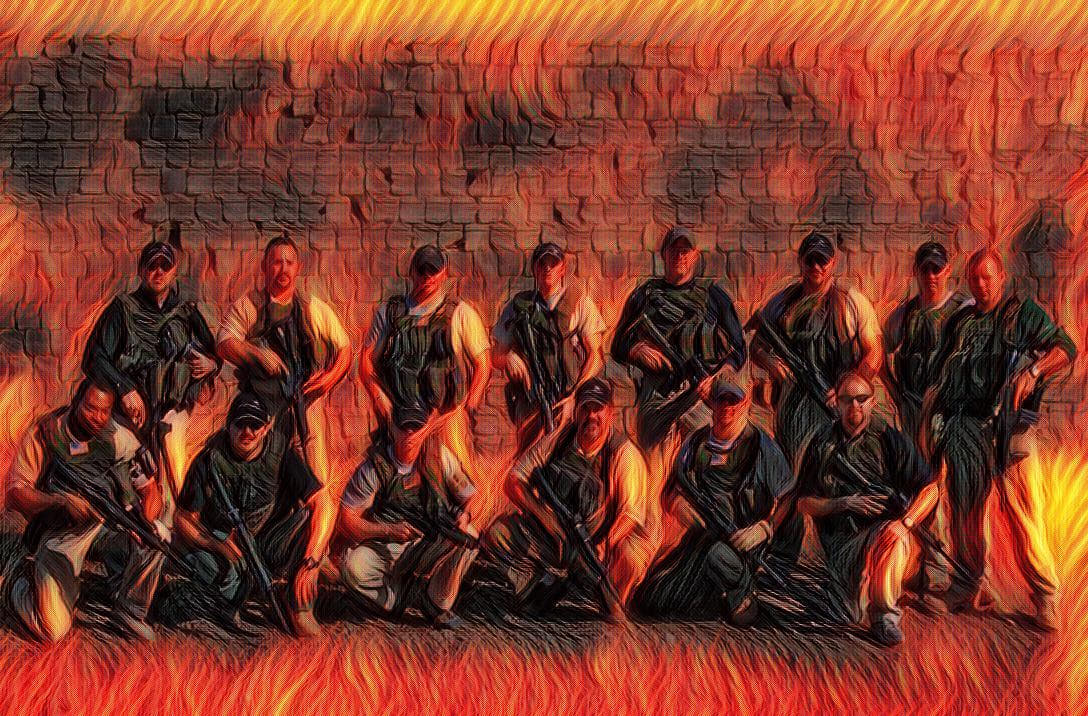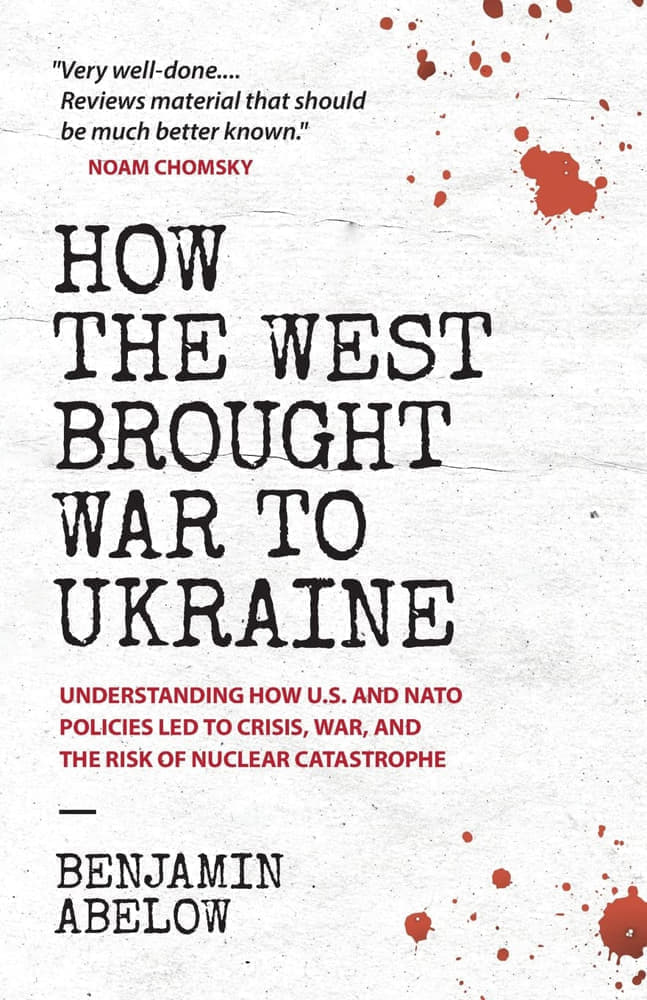[Read an excerpt from How the West Brought War to Ukraine]
It can be rather effectively argued that the greatest export commodity of the USA is war, commonly known as the Military Industrial Complex, which has spent the bloody decades after WWII bringing “democracy” to the benighted of the world—by bombs and sanctions, if necessary.
The latest such grand crusade is the war in Ukraine, which we have all been told to think of as “us” defending a fragile “democracy,” invaded out of the blue by the latest manifestation of Attila the Hun. Here was Ukraine happily minding its own business, until one day Putin woke up and decided that he needed to be a world-conqueror and off he went to “invade” Ukraine. The simplistic narrative of the “innocent” and the “criminal” has deep appeal in the Western psyche, conditioned no doubt by Hollywood. Thus, all the media had to do was point out the “criminal,” and the rest took care of itself. Out came all the virtue-signaling that the West is now so good at mustering. Now, there is not a shred of doubt in the minds of the majority in the West that this is a war between the “good guys” and the “Great Villain,” with the likes of Biden, Justin Trudeau, Britain and all the other cheerleaders for “democracy” constantly handing David’s loaded sling-shot to Ukraine to get the job done—but which the likes of Zelensky keep dropping. This is what fighting villainy to the last Ukrainian actually looks like.
But there is a far worse invasion that was completed a long time ago—that of the Western mind, addled by what is euphemistically known as “the mainstream media,” which knows that spin is the most effective form of victory in any war.
This is why Benjamin Abelow’s book, How the West brought War to Ukraine is a must-read, for it shows that this war is not about Ukraine, but about Russia, which needs to be brought to heel and become “democratic”: “…the vaunted goal of ‘regime change,’ which in the United States is sought by an informal alliance of Republican neoconservatives and Democratic liberal interventionists” (p. 5).
Abelow is careful in his analysis and gives a thorough and balanced account of what led Russia to undertake an attack on Ukraine on February 24, 2022. Despite mainstream narratives, the attack was carefully provoked (orchestrated comes to mind). So, unlike “settled history,” which would have us believe that Ukraine is the “innocent bystander” in all this, Abelow undertakes a meticulous unpacking of the various provocations (Ukrainian and Western), which began in 1990 and finally came to a head on February 24, 2022. Wars don’t just happen; they are the result of a long series of failures and outrages. In the words of Professor Richard Sakwa: “In the end, NATO’s existence became justified by the need to manage the security threats provoked by its enlargement. The former Warsaw Pact and Baltic states joined NATO to enhance their security, but the very act of doing so created a security dilemma for Russia that undermined the security of all” (p. 51).
Given that Russia is a nation-state, it must look after its geopolitical interests and defend what is crucial to what it deems necessary to continue, as Jacques Baud has so often pointed out in this magazine. Not to recognize these interests is to be blind to reality: “The underlying cause of the war lies not in an unbridled expansionism of Mr. Putin, or in paranoid delusions of military planners in the Kremlin, but in a 30-year history of Western provocations, directed at Russia, that began during the dissolution of the Soviet Union and continued to the start of the war. These provocations placed Russia in an untenable situation, for which war seemed, to Mr. Putin and his military staff, the only workable solution” (p. 7).
These provocations are now well-known, and thus rigorously ignored, denied or glossed over as “Russian propaganda.” These include bringing arms as close to the Russian border as possible; the expansion of NATO, despite promises given to Russia that that would never happen; the withdrawal of the US from the Antiballistic Missile Treaty and the Intermediate Range Nuclear Forces Treaty (which now gives the US first-strike capability); the ousting of a democratically elected Ukrainian government and installing neo-Nazis into power in 2014; NATO military exercises along the Russian border; pushing Ukraine to join NATO, despite warnings from Russia that that would mean war; since 2014, training and arming the Ukrainian military, in which many of the units are openly neo-Nazi; actively nurturing Russophobia in Ukraine; encouraging the bloody war in the Eastern portions of Ukraine, which were seen as “pro-Russian” and therefore hostile. There are many others that can be listed.
Of course, the last provocation was telling Zelensky not to negotiate when Russia attacked on February 24. He was ready to do so, and a war would have easily have been avoided, and many helpless lives saved. But Boris Johnson flew out, met the Ukrainian president, and negotiation was off the table.
And this is the most baffling thing—the West does not want peace at all. It wants a war of total annihilation for Russia, which will never happen, of course, but which the West so far seems not to understand (perhaps because it is now governed by leaders who have little understanding of warcraft). No Western politician bravely calls for negotiations, for a ceasefire, for peace, for even a little breather. It’s war and more war, and the billions and arms keep pouring in: “To my knowledge, Zelensky never received any substantial American support to pursue his peace agenda. Instead, he was subjected to repeated visits by leading American politicians and State Department officials, all of whom spouted a theoretical principle of absolute Ukrainian freedom, defined as the “right” to join NATO and to establish a U.S. military outpost on Russia’s border. In the end, this “freedom” was worse than a pipe dream. Although it advanced the aims of the United States—or, more accurately, the interests of certain American political, military, and financial factions—it destroyed Ukraine” (p. 60).
The military historian Bernard Wicht, whose interview appears elsewhere in this magazine, very astutely observes that the West no longer has the ability to wage conventional war—not even the United States; this is why armed conflict in the 21st century is now “farmed” out to modern-day condottieri, who bring their private armies wherever their paymasters tell them to go. Is this is why billions are being sent to Ukraine, to pay for all the mercenaries? The war machine chugs along, indeed.
The strength of Abelow’s book is that it makes complexity accessible. Wars have so many moving parts, and Abelow with a deft hand guides the reader along. As is true of all good writers, this book is filled with clarity and insight, with an eye for the bigger picture, and all the while letting facts lead where they will. This is a rare talent nowadays.
Given the much-mentioned threat of nuclear war, the book ends with a prescient warning: “Policy makers in Washington and the European capitals—along with the captured, craven media that uncritically amplify their nonsense—are now standing up to their hips in a barrel of viscous mud. How those who were foolish enough to step into that barrel will find the wisdom to extricate themselves before they tip the barrel and take the rest of us down with them is hard to imagine” (p. 62).
Finally, as professor Sakwa pointed out, this entire tragedy would have been easily avoided if Zelensky had been encouraged to say just five little words: “Ukraine will not join NATO.” Why he could not say that lays the entire blood-guilt upon the collective leadership of the West.
How the West brought War to Ukraine is satisfying to read because it brings truth to light—and that is the highest calling any worthy writer can pursue. Rush out and buy it; and after you’ve read it, you will be both amazed and infuriated. The condottieri now run the show—but perhaps we the decent folk of this world will learn once again how to get rid of them. Perhaps this will be this war’s silver lining.
C.B. Forde lives in rural Ontario, Canada, where he reads, thinks and dreams.

